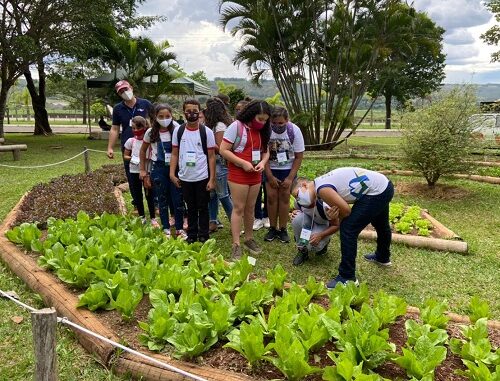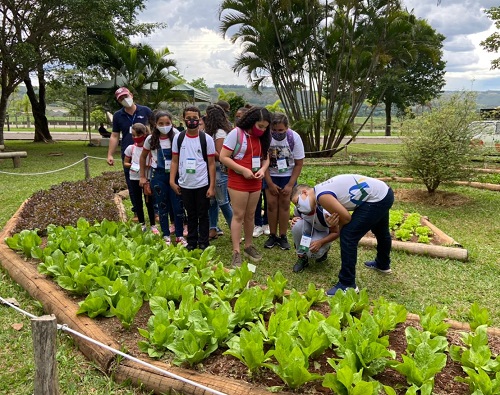
From October 26 to 28, the space of Embrapa Hortaliças (Brasília-DF) was occupied by guests interested and curious about the news presented at the fourth edition of the science and technology exhibition “Future Researchers: Integrating Children and Youth from the Federal District and its Surroundings”, with the support of CNPq and the Ministry of Science and Technology. With the theme of “CT & I’s Transversality in Search of Healthy, Sustainable Food,” the fair had many attractions as the science behind food was presented in a fun and interactive way. The program included lectures by researchers (which highlighted the role of science in the production of healthy foods), visits to laboratories (where students were introduced to tools used, for example, in the fields of helminology and plant pathology to identify plant diseases), and presentation of techniques that help make Agriculture is more sustainable, such as the prototype of an effluent treatment plant (ETE), which is important for saving water in irrigation, as well as a compost plant, a process that converts organic matter into compost, with the consequent savings in inputs. In recycling and garden production workshops in small spaces, visitors had an active participation. Observers and vigilantes asked questions and discussed the importance of not indiscriminate disposal of materials that take time to degrade in nature, with impacts on the environment, and that can be reused, such as making toys and games for children, such as displayed in the exhibition – checkers made of disposable cups were one of the attractions. Equal interest in vegetable gardens, and in “living classes,” where they answered questions about which vegetables can be grown in small spaces and how to utilize this knowledge to produce their own food. They also took the opportunity to deconstruct some concepts, such as “carrots grow on trees”. In addition to the activities presented, the students received bags with small carrots and a set of publications – magazines “Horta & Liça” and the latest edition of “Scarecrow”, which teach how to create a mini vegetable garden, downloadable in PDF format. Learning Teacher Lúcia Hipólito, who teaches fifth-year students at Escola-Class 415, highlighted the importance of the exhibition in bringing science into the daily lives of children and young people. It seems that science and the role of the world are very far from our reality. , when this problem is actually present in all aspects of daily life, especially when we know, as in the case of this event, the clients who are working for us to have a healthier life,” assesses the teacher, for whom the students “absorb the knowledge that will be valid.” for life.” The initiator of the exhibition contract also congratulated Professor Claudia Oliveira, of Escola Fernando Sabino, in Santo Antonio do Discoberto, who referred to the recycling workshop as one of the highlights of the programme. According to her, “All this information will enhance the background of these children In terms of appreciating concern for the environment, growing with this environmental awareness will be of great value to ensure our ecosystem is nurtured in the future.” Oliveira compares “When a child takes care of a seed, he takes care of the tree of the future.”
From October 26 to 28, space Vegetable Embrapa (Brasília-DF) by guests interested and curious about the news presented at the fourth edition of the science and technology fair “Future Researchers: Integrating Children and Youth from the Federal District and Surroundings”, held with the support of CNPq e do The Ministry of Science and Technology. With the theme of “CT & I’s Transversality in Search of Healthy, Sustainable Food,” the fair had many attractions as the science behind food was presented in a fun and interactive way.
The program included lectures by researchers (highlighting the role of science in the production of healthy foods), visits to laboratories (where students were introduced to tools used, for example, in the fields of helminology and plant pathology to identify plant diseases), and presentation of techniques that help make farming More sustainable, like the prototype of effluent treatment plant (ETE), important for saving water in irrigation, as well as plant composting, a process that converts organic matter into compost, with consequent input savings.
In recycling and garden production workshops in small spaces, visitors had an active participation. Observers and watchers asked questions and discussed the importance of not indiscriminately disposing of materials that take time to degrade in nature, with impacts on the environment, and that can be reused, such as making toys and games for children, such as displayed at the fair – checkers made of disposable cups were one of the attractions.
equal interest in gardensand through Living Classes, where they answered questions about which vegetables can be grown in small spaces and how to use this knowledge to produce their own food. They also took the opportunity to deconstruct some concepts, such as “carrots grow on trees”.
In addition to the activities offered, the students received bags with small islands and a set of publications – “Horta & Liça” magazines and the latest issue of “straw man‘, which teaches how to create a mini botanical garden, and can be downloaded in PDF format.
learning
The importance of the exhibition in bringing science into the daily lives of children and young people was highlighted by teacher Lucia Hippolito, who teaches fifth graders at Escola-Class 415. The role of the scientist seems very far from our reality. , when this problem is actually present in all aspects of daily life, especially when we know, as in the case of this event, the clients who are working for us to have a healthier life,” assesses the teacher, for whom the students “absorb the knowledge that will be valid.” forever “.
The initiative to set up the exhibition was also congratulated by Professor Claudia Oliveira, of Escola Fernando Sabino, in Santo Antonio do Discoberto, who cited the recycling workshop as one of the highlights of the programme. According to her, “All of this information will enhance these children’s background regarding an appreciation of concern for the environment, and growing up with this environmental awareness will be of great value to ensuring our ecosystem is cared for in the future.” Oliveira compares “When a child takes care of a seed, he takes care of the tree of the future.”
Source: ambraba

“Wannabe internet buff. Future teen idol. Hardcore zombie guru. Gamer. Avid creator. Entrepreneur. Bacon ninja.”

